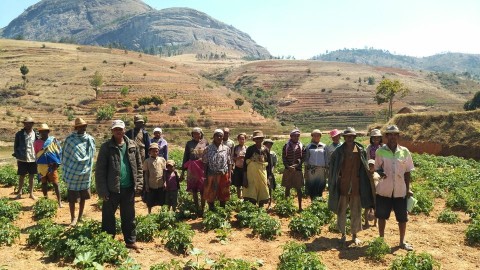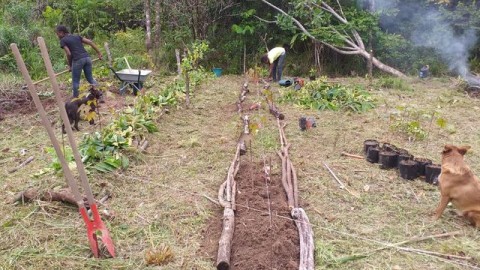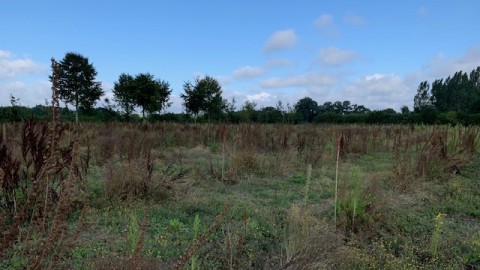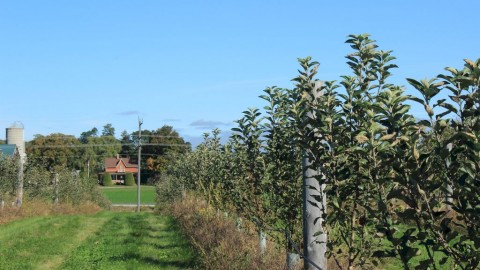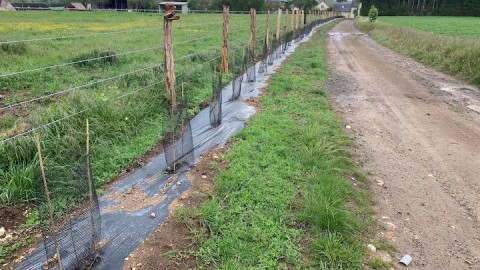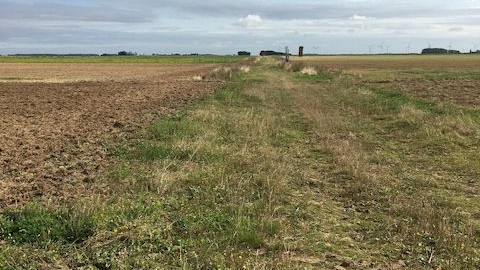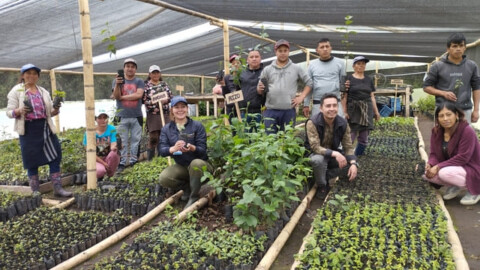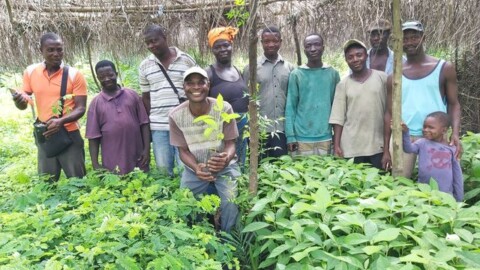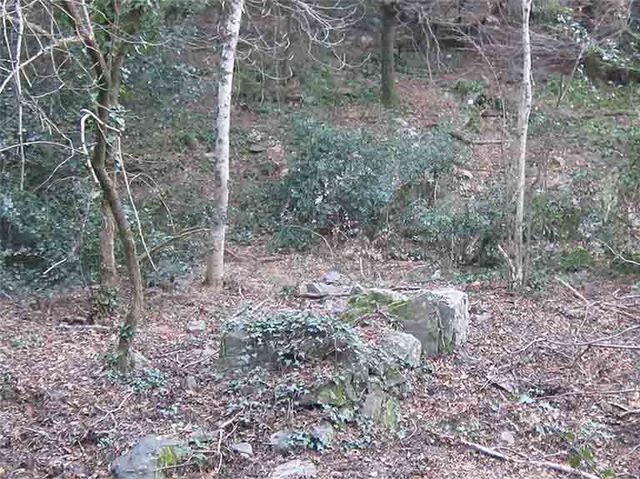
Background & challenges
After studying agronomy and forestry, a young market gardener wants to launch a pioneering project in France. It involves planting a wide variety of trees on a small plot of sloping land. Over three years, 1,480 trees of 63 different species will be planted on 3.4 hectares.
There are many environmental issues at stake in this organic farming project.
First of all, resistance to climate change is taken into account in the choice of species. This varied choice will ensure biodiversity. Trees serve as a refuge for various populations of crop auxiliaries (insects, bacteria, fungi…) and macrofauna (especially earthworms) to fight in particular the disappearance of insects and avoid the use of pesticides.
Trees and shrubs store carbon, including in the soil. Thus the soils, sensitive to erosion in this area, will be enriched, stabilized and protected. The presence of trees will also provide crops with better protection from the winds and bad weather that can be violent in the region.
Regarding water resources, the project involves restoring a forest along the adjacent creek, improving its water quality. The trees will provide shade, thus enhancing the farmer’s well-being, limiting the water consumption of plants cultivated under the trees and inserted between the rows of trees (old and forgotten, market garden varieties, medicinal and aromatic plants, edible wild flowers and plants, unusual tubers).
The trees planted will provide the market garden with a wide diversity of additional production:
- fruits (khakis, blackberries, locust beans, hazelnuts, and 24 species of berries / small fruits), which will be made into jam or eaten as they are, and nuts or oilseeds (olives, pine nuts, walnuts, acorns, hazelnuts, pistachios, almonds, chestnuts);
- energy wood from pruned branches (lime, elm, charm…), timber (chestnut, hackberry, beech… these trees will therefore be cut and replanted);
- other products derived from the trees such as leaves (lime, elm, hornbeam, beech, mulberry, hibiscus and 11 other species), gum or manna (pistachio, pine, copalm), bark or sap (lime, walnut, elm), seeds (elm, hawk), flowers (albizia, Judean tree, magnolia, paulwonia, locust, hazelnut), especially honey, aromatic or medicinal products (myrtle, pistachio, sumac, chaste), basketry (dogwood, fustet), cleaning products (seringat, céanothe)…
This project will consequently give farmer greater autonomy and enable her to better exploit this poorly mechanizable area. The overall agricultural system of the farm will be more sustainable in all respects.
Project type

Agroforestry
Beneficiary

A young market gardener (a woman)
Number of trees

1,480 trees over three years (2019-2021), of which 592 in 2019. All the trees are destined to remain in a stabilized plot management situation.
Species planted

More than 63 different species for 1,480 trees in three years! Mainly: Diospyros khaki (khaki), grafted fruit trees (pomegranate, kiwi, quince, apple, pear, fig, plum, peach, cherry, apricot), Tilia sp. (lime tree), Morus sp. (mulberry), Ulmus resista (Japanese elm), Cornus sp. (dogwood)… but also, Cercis siliquastrum (Judean tree), Juglans sp. (walnut), Ceratonia siliqua (carob), Sambucus sp. (elder)…
Partner

The French Agroforestry Association (Association Française d’Agroforesterie, AFAF)
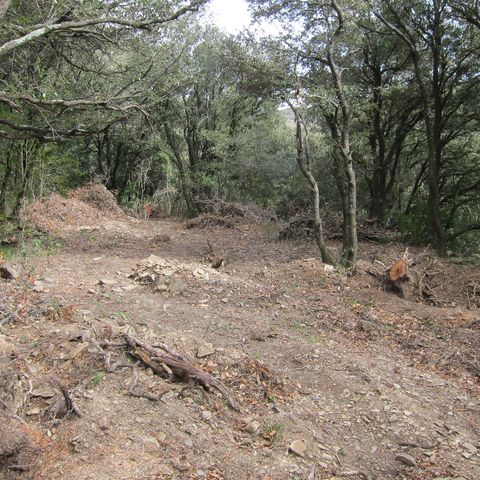
Works timeline
Different techniques combining natural regeneration and tree planting will be used. Natural regeneration involves selecting encouraging trees that are already in place and protecting them to allow them to grow.
No heavy mechanization is planned. Erosion-sensitive areas have been identified and will also benefit from permanent cover. Some agricultural maintenance work will be carried out using mechanical tools: chainsaws and brush cutters, for which the market gardener has received training
March 2019: 145 trees planted (10% of the target) with 3 different species
- 1st manual soil preparation and purchasing of plants
- 1st test plantation in zone 3 (see map) before bigger plantations are carried out, protection and mulching are put in place.
November 2019 then 2020 then 2021 – 30% of the trees planted per year
- Manual soil preparation of the planting rows
- Delivery of plants
- November and December: planting, installation of protection and mulching
2019 to 2024: maintening the plantation, replanting when necessary (if the condition of the trees is too poor, they will be replanted) and first round of pruning/trimming. Additional plantations (diversification).
2021 and beyond: pruning, harvesting starts progressively (fruit, energy wood, fodder, bark).
March 2019 : 100 Diospyros kaki (khaki fruit), 35 Psidium catleyanum (China guava tree), 10 Morus sp. (mulberry)
Automne 2019 : 20 Pinus sp. (pine), 10 Albizia julibrissin (Persian silk tree), 5 Celtis australis (Mediterranean hackberry),10 Cercis siliquastrum (Judean tree), 25 Ceratonia siliqua (carob), 10 Morus sp. (mulberry), 5 Olea europaea (olive tree), 35 Hippophae rhamnoides (common sea buckthorn), 10 Medicago arborea (shrub medick), 10 Myrtus communis (myrtle), 1 Pistacia lentiscus (lentisk pistachio), 5 Pistacia vera (pistachio), 10 Rhus coriaria (sicilian sumac), 5 Prunus dulcis (almond), 10 Sassafras albidum (white sassafras), 70 Tilia sp. (lime tree), 10 Toona sinensis (Chinese mahogany), 50 Ulmus resista (Japanese elm), 35 Actinidia arguta (hardy kiwi), 35 Amelanchier sp. (shadbush), 35 Aronia sp. (aronia), 10 Atriplex halimus (Mediterranean saltbush), 10 Cotinus coggygria (smoke tree), 18 Crataegus sp. (hawthorn)
Planting partner
The French Agroforestery Association (AFAF), created in 2007 under the 1901 law, works to develop agroforestry in France both on the agricultural and political scene and with the general public. It is a platform for exchanges and partnerships between farmers, agroforestry operators, research, political decision-makers, local authorities, and administrative bodies. AFAF puts forward proposals at both national and international levels and works to ensure that trees find their place again within agricultural systems.
The role of the Association in this project is to ensure technical follow-up with the market gardener over time and provide the necessary information for communications purposes.
Budget
The total budget to be collected is €31,080, i.e. €21 per tree, broken down as follows:
- Plants and replanting: €3.7
- Mulching: €0.90
- Protection and stakes: €2.10
- Technical advice: €3.50
- Follow-up over three years: €0.90
- Coordination, project management and communication: €5.8
- A Tree For You collection, monitoring and communication costs: €4.10
They donated to support this project in 2019 and 2020:





